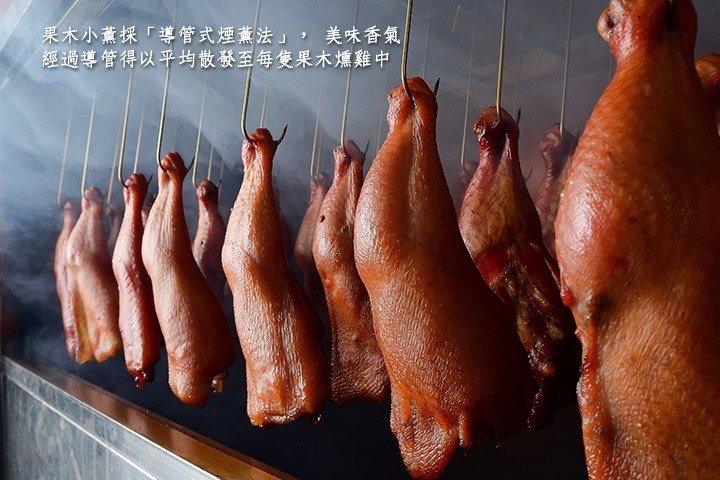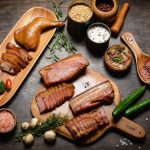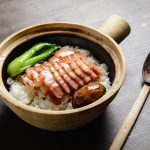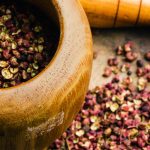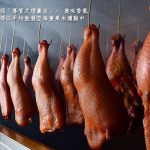Cured Bacon – A Taste of Nostalgia for Taiwan
YOUR KEY TO SUCCESS
At Corpus, we believe bespoke cross-cultural learning is key.
Corpus has developed a fresh, innovative yet internationally renowned teaching methodology, delivering a unique, practical and fun educational experience.
Free subscription to access the complete content and a selection of lessons.
Click below to start learning Mandarin!
台湾的美食回忆 – 腊肉
Tái wān de měi shí huí yì – là ròu
腊肉香,是台湾独特的时代记忆。几十年前的眷村时代,社会正在经历战后重建,生活困苦,肉类当然是桌上罕见的料理。为了保存珍贵的肉,腊肉的做法十分费工,通常在晚上用调味料腌制,白天进行曝晒,让味道慢慢封存在肉里。因此,家家户户将腌制好的腊肉挂在门口,就成为眷村常见的景象。
Là ròu xiāng, shì tái wān dú tè de shí dài jì yì. Jǐ shí nián qián de juàn cūn shí dài, shè huì zhèng zài jīng lì zhàn hòu chóng jiàn, shēng huó kùn kǔ, ròu lèi dāng rán shì zhuō shàng hǎn jiàn de liào lǐ. Wèi le bǎo cún zhēn guì de ròu, là ròu de zuò fǎ shí fēn fèi gōng, tōng cháng zài wǎn shàng yòng tiáo wèi liào yān zhì, bái tiān jìn xíng pù shài, ràng wèi dào màn màn fēng cún zài ròu lǐ. Yīn cǐ, jiā jiā hù hù jiāng yān zhì hǎo de là ròu guà zài mén kǒu, jiù chéng wéi juàn cūn cháng jiàn de jǐng xiàng.
对于眷村小孩来说,腊肉是令人垂涎欲滴的美味料理。每个重要节庆,腊肉就是一道经典的围炉年菜。烟熏腊肉加上一点青菜,就是养大无数眷村小孩的美味记忆。
Duì yú juàn cūn xiǎo hái lái shuō, là ròu shì lìng rén chuí xián yù dī de měi wèi liào lǐ. Měi gè zhòng yào jié qìng, là ròu jiù shì yī dào jīng diǎn de wéi lú nián cài. Yān xūn là ròu jiā shàng yī diǎn qīng cài, jiù shì yǎng dà wú shù juàn cūn xiǎo hái de měi wèi jì yì.
虽然现在人们生活富裕,已经不需要用这种方式保存肉品,但腊肉已经变成一种怀旧,愈来愈多人也尝试找回记忆中的好味道。来自台湾的【果木小薰】,便是传承了四代的腊肉品牌,用真材实料重现小时候的美食回忆。
Suī rán xiàn zài rén men shēng huó fù yù, yǐ jīng bù xū yào yòng zhè zhǒng fāng shì bǎo cún ròu pǐn, dàn là ròu yǐ jīng biàn chéng yī zhǒng huái jiù, yù lái yù duō rén yě cháng shì zhǎo huí jì yì zhōng de hǎo wèi dào. Lái zì tái wān de [guǒ mù xiǎo xūn], biàn shì chuán chéng le sì dài de là ròu pǐn pái, yòng zhēn cái shí liào chóng xiàn xiǎo shí hòu de měi shí huí yì.
当初,出身湖南世家的奶奶,来台后在雾峰光复新村落脚,也将家乡的腊肉传统保存下来。奶奶特别使用台湾在地、成本较高的龙眼木炭、稻壳、以及柑橘果皮等天然材料烟熏,为腊肉带来独特的风味。后代则改良保存技术,用专业冷冻技术取代容易致癌的亚硝酸盐,凭着家传经验与匠人的坚持,让腊肉重回台湾的料理舞台。
Dāng chū, chū shēn hú nán shì jiā de nǎi nai, lái tái hòu zài wù fēng guāng fù xīn cūn luò jiǎo, yě jiāng jiā xiāng de là ròu chuán tǒng bǎo cún xià lái. Nǎi nai tè bié shǐ yòng tái wān zài dì, chéng běn jiào gāo de lóng yǎn mù tàn, dào ké, yǐ jí gān jú guǒ pí děng tiān rán cái liào yān xūn, wèi là ròu dài lái dú tè de fēng wèi. Hòu dài zé gǎi liáng bǎo cún jì shù, yòng zhuān yè lěng dòng jì shù qǔ dài róng yì zhì ái de yǎ xiāo suān yán, píng zhe jiā chuán jīng yàn yǔ jiàng rén de jiān chí, ràng là ròu chóng huí tái wān de liào lǐ wǔ tái.
作者介绍
作者毕业于台大外文系,大学时期涉略英美文学、西班牙文学与拉丁美洲文学,期间曾赴西班牙马德里交换,开启背包客旅程和踏上朝圣之路。目前担任兼职译者与科柏斯英文顾问。热衷文化观察,乐于透过旅游或阅读学习各文化相同和不同之处。
臺灣的美食回憶 – 臘肉
Tái wān de měi shí huí yì – là ròu
臘肉香,是臺灣獨特的時代記憶。幾十年前的眷村時代,社會正在經歷戰後重建,生活困苦,肉類當然是桌上罕見的料理。為了保存珍貴的肉,臘肉的做法十分費工,通常在晚上用調味料醃製,白天進行曝曬,讓味道慢慢封存在肉裡。因此,家家戶戶將醃製好的臘肉掛在門口,就成為眷村常見的景象。
Là ròu xiāng, shì tái wān dú tè de shí dài jì yì. Jǐ shí nián qián de juàn cūn shí dài, shè huì zhèng zài jīng lì zhàn hòu chóng jiàn, shēng huó kùn kǔ, ròu lèi dāng rán shì zhuō shàng hǎn jiàn de liào lǐ. Wèi le bǎo cún zhēn guì de ròu, là ròu de zuò fǎ shí fēn fèi gōng, tōng cháng zài wǎn shàng yòng tiáo wèi liào yān zhì, bái tiān jìn xíng pù shài, ràng wèi dào màn màn fēng cún zài ròu lǐ. Yīn cǐ, jiā jiā hù hù jiāng yān zhì hǎo de là ròu guà zài mén kǒu, jiù chéng wéi juàn cūn cháng jiàn de jǐng xiàng.
對於眷村小孩來說,臘肉是令人垂涎欲滴的美味料理。每個重要節慶,臘肉就是一道經典的圍爐年菜。煙燻臘肉加上一點青菜,就是養大無數眷村小孩的美味記憶。
Duì yú juàn cūn xiǎo hái lái shuō, là ròu shì lìng rén chuí xián yù dī de měi wèi liào lǐ. Měi gè zhòng yào jié qìng, là ròu jiù shì yī dào jīng diǎn de wéi lú nián cài. Yān xūn là ròu jiā shàng yī diǎn qīng cài, jiù shì yǎng dà wú shù juàn cūn xiǎo hái de měi wèi jì yì.
雖然現在人們生活富裕,已經不需要用這種方式保存肉品,但臘肉已經變成一種懷舊,愈來愈多人也嘗試找回記憶中的好味道。來自臺灣的【果木小薰】,便是傳承了四代的臘肉品牌,用真材實料重現小時候的美食回憶。
Suī rán xiàn zài rén men shēng huó fù yù, yǐ jīng bù xū yào yòng zhè zhǒng fāng shì bǎo cún ròu pǐn, dàn là ròu yǐ jīng biàn chéng yī zhǒng huái jiù, yù lái yù duō rén yě cháng shì zhǎo huí jì yì zhōng de hǎo wèi dào. Lái zì tái wān de [guǒ mù xiǎo xūn], biàn shì chuán chéng le sì dài de là ròu pǐn pái, yòng zhēn cái shí liào chóng xiàn xiǎo shí hòu de měi shí huí yì.
當初,出身湖南世家的奶奶,來臺後在霧峰光復新村落腳,也將家鄉的臘肉傳統保存下來。奶奶特別使用臺灣在地、成本較高的龍眼木炭、稻殼、以及柑橘果皮等天然材料煙燻,為臘肉帶來獨特的風味。後代則改良保存技術,用專業冷凍技術取代容易致癌的亞硝酸鹽,憑著家傳經驗與匠人的堅持,讓臘肉重回臺灣的料理舞台。
Dāng chū, chū shēn hú nán shì jiā de nǎi nai, lái tái hòu zài wù fēng guāng fù xīn cūn luò jiǎo, yě jiāng jiā xiāng de là ròu chuán tǒng bǎo cún xià lái. Nǎi nai tè bié shǐ yòng tái wān zài dì, chéng běn jiào gāo de lóng yǎn mù tàn, dào ké, yǐ jí gān jú guǒ pí děng tiān rán cái liào yān xūn, wèi là ròu dài lái dú tè de fēng wèi. Hòu dài zé gǎi liáng bǎo cún jì shù, yòng zhuān yè lěng dòng jì shù qǔ dài róng yì zhì ái de yǎ xiāo suān yán, píng zhe jiā chuán jīng yàn yǔ jiàng rén de jiān chí, ràng là ròu chóng huí tái wān de liào lǐ wǔ tái.
作者介紹
作者畢業於臺大外文系,大學時期涉略英美文學、西班牙文學與拉丁美洲文學,期間曾赴西班牙馬德里交換,開啟背包客旅程和踏上朝聖之路。目前擔任兼職譯者與科柏斯英文顧問。熱衷文化觀察,樂於透過旅遊或閱讀學習各文化相同和不同之處。
Cured Bacon – A Taste of Nostalgia for Taiwan
The scent of cured bacon is a unique food memory for many Taiwanese. Decades ago, military dependents’ villages could be seen all over Taiwan. It was a post-war society, and many families were struggling to survive. As a result, meat became a luxury. In order to preserve it, the making of cured bacon originating from Hunan region started to gain popularity. Hanging bacon was ubiquitous in a military village at that time. However, the process is tiresome. People had to season the meat at night and hang dry it in the day. After these procedures, the shelf-life will be extended and the flavor enhanced.
For many Taiwanese who grew up in a military village, mouth-watering cured bacon is a rare dish. It would only appear in important gatherings and festivals. Dishes like stir fried cured bacon with vegetables are an irreplaceable food memory for these children.
Local Taiwanese brand KUMU’s Natural Food aims to bring back this unique and nostalgic taste. Although people’s living standard has improved greatly and they have better ways to preserve meat, more and more people are reminiscing about this savory dish. In other words, cured bacon has become a taste of nostalgia in Taiwan.
Using the secret recipe that has been passed down for four generations, KUMU’s Natural Food successfully recreated these valuable childhood memories. The recipe was invented by the grandma of Hunan origin who settled in the Guangfu Millitary Village in Wufeng, Taichung after arriving in Taiwan. She carefully chose the charcoal of Longan wood, rice shell and tangerine peel to smoke the pork, creating a unique aroma for the meat product. The later generations improved the preserving methods, and replaced nitrite by using better freezing technologies. Combining generations of experience and innovative technologies, KUMU’s Natural Food is no doubt bringing this nostalgic taste back to the landscape of Taiwanese cuisine.
About the Author
Linda Wang graduated from the Department of Foreign Languages and Literatures of National Taiwan University, where she studied English and American literature, Spanish literature and Latin-American literature. During her study, she went to Madrid, Spain as an exchange student and started her backpacking experience, including a trip to The Portuguese Way. She is now a freelance translator and English consultant at Corpus. Her passion is observing the similarities and differences across cultures through travelling and reading.
Bacon curado – un sabor de nostalgia para Taiwán
El aroma del tocino curado es un recuerdo único para muchos taiwaneses. Hace décadas, los pueblos militares de los dependientes se podían ver por todo Taiwán. Era una sociedad de posguerra, y muchas familias luchaban por sobrevivir. Como resultado, la carne se convirtió en un lujo. Con el fin de preservarlo, la receta de tocino curado originario de la región de Hunan comenzó a ganar popularidad. Tocino colgante se podía ver en todas partes en los pueblos. Sin embargo, el proceso es tedioso. La gente tenía que sazonar la carne por la noche, y colgarlo para su secado en el día. Después de estos procedimientos, la vida útil se extenderá y el sabor se mejorará.
Para muchos taiwaneses que crecieron en un pueblo militar, tocino curado delicioso es un plato infrecuente. Sólo aparecería en las reuniones y festivales importante. Platos como el cerdo curado frito con verduras son un recuerdo de comida insustituible para estos niños.
La marca taiwanesa local KUMU’s Natural Food tiene como objetivo traer de vuelta este sabor único y nostálgico. Aunque el nivel de vida de las personas ha mejorado mucho y tienen mejores maneras de preservar la carne, cada vez más personas están recordando este sabroso plato. El tocino curado se ha convertido en un sabor de nostalgia en Taiwán.
La receta secreta de KUMU’s Natural Food se ha transmitido durante cuatro generaciones. La receta fue inventada por la abuela de origen Hunan que se estableció en el pueblo de Guangfu Millitary en Wufeng, Taichung después de llegar a Taiwán. Eligió cuidadosamente el carbón de madera de Longan, cáscara de arroz y cáscara de mandarina para ahumar el cerdo, creando un aroma único para el producto cárnico. Las generaciones posteriores mejoraron los métodos de conservación y reemplazaron el nitrito mediante el uso de mejores tecnologías de congelación. Después de combinar la sabiduría de las generaciones pasadas y tecnologías innovadoras, KUMU’s Natural Food ha logrado traer este sabor nostálgico de nuevo al paisaje de la cocina taiwanesa.
Autor: Linda Wang
Se graduó de la facultad de lenguas y literaturas extranjeras de Universidad Nacional de Taiwán donde estudió las literaturas de Inglaterra, Estados Unidos, España y Latinoamérica. Durante su estudio, fui a Madrid como estudiante de intercambio, y empezó su experiencia de mochilero por Europa, incluido el camino de Santiago. Ahora trabaja como autónoma en la esfera de la enseñanza y traducción de la lengua inglesa. Su gran pasión es observar las diferencias y similitudes entre culturas a través de los viajes y la lectura.
Photo credit: http://kumu.tw/

